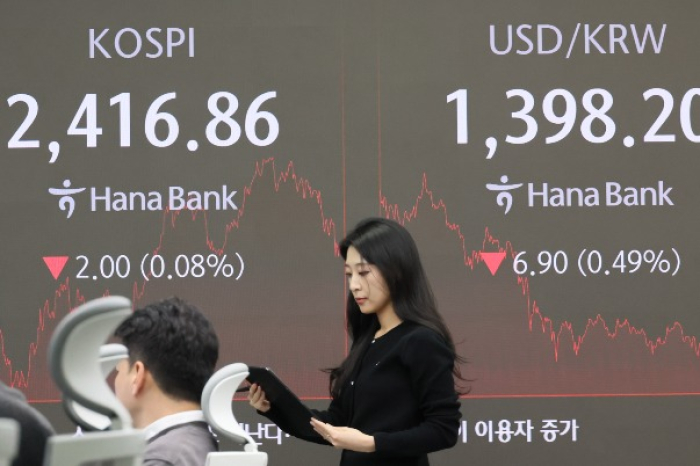S.Korean firms’ rights issues poised for 12-year low
A larger number of companies gave up IPOs and delisted from the Korean stock market
By Nov 17, 2024 (Gmt+09:00)
LG Chem to sell water filter business to Glenwood PE for $692 million


Kyobo Life poised to buy Japan’s SBI Group-owned savings bank


KT&G eyes overseas M&A after rejecting activist fund's offer


StockX in merger talks with Naver’s online reseller Kream


Mirae Asset to be named Korea Post’s core real estate fund operator



The lackluster South Korean stock market and softening Korean currency have discouraged local companies from raising money at home and pushed some to look abroad in search of funds.
Companies listed on the main bourse, the Kospi, have raised a total of 4.6 trillion won ($3.3 billion) in rights offerings so far this year, according to the Korea Exchange. For all of 2024, their rights issues are forecast to be the lowest amount since notching 3.2 trillion won in 2012.
That compares with 13.8 trillion won and 17.1 trillion won in rights issues attracted in 2017 and 2020, respectively, when the Kospi and Kosdaq indexes enjoyed an upward streak. Those two figures marked the largest and second-largest rights offerings in Korean stock market history.
The Kospi index has dropped 9.0% from the start of this year to Nov. 15, making it the worst performer among major Asian stock markets. The Kospi has been trapped between 2,200 and 2,900 since 2023.
On Nov. 15, Kospi-listed companies traded at an average of a 0.85 multiple of their book value — their lowest this year.
The won weakened to 1,406.65 per US dollar on Nov. 12, compared with 1,293.5 at the end of 2023. On Nov. 15, it pared some losses to close domestic trading at 1,398.20 against the greenback.

DELISTING
Some companies saw no merit in staying listed and opted to go private.
Eight companies have already delisted, or are in the process of delisting through tender offers for their shares this year, according to the Korea Exchange. That number is double that of last year.
Among them are SK Rent A Car Co., cement maker Ssangyong C&E Co., medical device maker Jeisys Medical Inc. and software developer Connectwave Co., as well as software firm BusinessOn Communication Co. and food container maker Lock&Lock Co.
SBI FinTech Solutions Co. embarked on the process of delisting from the Kosdaq junior market on Nov. 15. The company is majority owned by Japanese financial services group SBI Group.
“We can reduce the cost spent to stay listed,” said an official at SBI FinTech Solutions. “It was not necessary for us to raise money in the public market.”

IPOs
A total of 50 companies went public on the Kosdaq junior market this year. The tally is expected to drop from last year’s 77, even when including companies preparing for a Kosdaq debut later this year.
After dropping a domestic IPO in October, Viva Republica, the operator of fintech platform Toss, is now seeking a US market debut. The same month, the Korean online bank K Bank cancelled its IPO.
Travel and accommodation booking app Yanolja and KKR-backed online fashion platform Musinsa are also mulling US listings. Essex Solutions, a winding wire manufacturer under LS Cable & System Co., is considering a US IPO next year.
“The atmosphere in the Korean stock market is like treading on thin ice due to the soaring dollar value and poor earnings by major companies,” said the finance team head of a listed Korean company.
“There are growing concerns about how to maintain our corporate value and how to raise money,” he added.
Write to Ik-Hwan Kim and Jeong-Cheol Bae at lovepen@hankyung.com
Yeonhee Kim edited this article
-
 Mergers & AcquisitionsKorea Zinc drops $1.8 bn rights issue to regain shareholder support
Mergers & AcquisitionsKorea Zinc drops $1.8 bn rights issue to regain shareholder supportNov 13, 2024 (Gmt+09:00)
4 Min read -
 Upcoming IPOsCuckoo eyes $172 mn IPO of Malaysian unit in Kuala Lumpur: Bloomberg
Upcoming IPOsCuckoo eyes $172 mn IPO of Malaysian unit in Kuala Lumpur: BloombergOct 30, 2024 (Gmt+09:00)
2 Min read -
 IPOsSouth Korea’s Viva Republica drops Korean IPO plan, seeks US debut
IPOsSouth Korea’s Viva Republica drops Korean IPO plan, seeks US debutOct 29, 2024 (Gmt+09:00)
2 Min read -

-
 E-commerceYanolja's Nasdaq IPO plan hit by Qoo10's liquidity turmoil
E-commerceYanolja's Nasdaq IPO plan hit by Qoo10's liquidity turmoilAug 23, 2024 (Gmt+09:00)
2 Min read -
 Private equityAffinity fails in Lock&Lock tender offer; eyes equity swap
Private equityAffinity fails in Lock&Lock tender offer; eyes equity swapJun 06, 2024 (Gmt+09:00)
1 Min read -
 ElectronicsLG Display to raise $971 mn in rights offering for OLED business
ElectronicsLG Display to raise $971 mn in rights offering for OLED businessMar 04, 2024 (Gmt+09:00)
1 Min read


